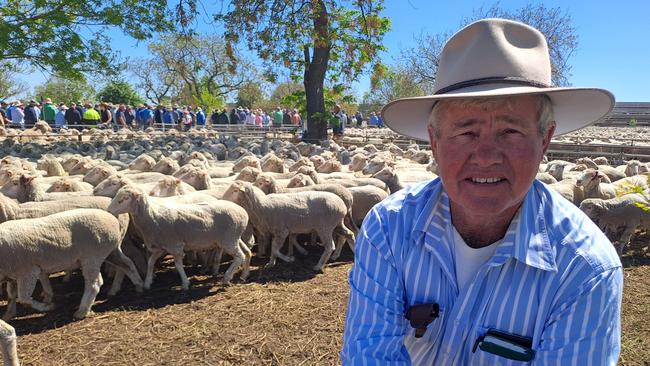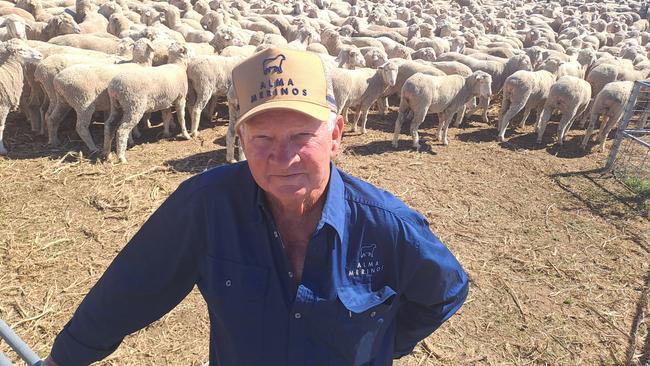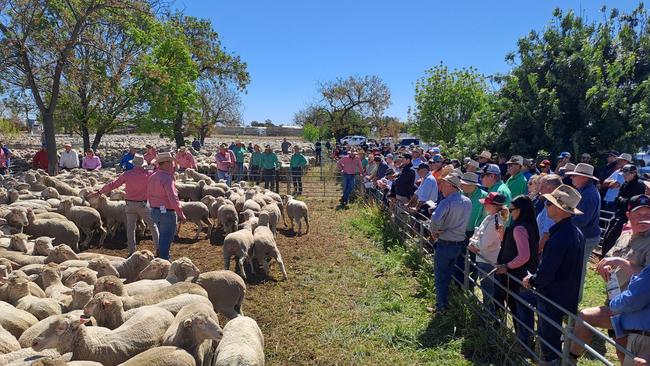Hay sheep sale: wild price ride for replacement Merinos
About 29,000 sheep were yarded at the Hay sheep sale as breeders held back from the troubled market. See how the sale went.
Young Merino ewes sold from $60 to a top of $252 at Hay in NSW today in a sale that was something of a conundrum for being dearer than expected but also looking awfully cheap at times.
About 29,000 sheep were yarded, down from the usual 40,000-plus as breeders held back stock from the troubled market.
For those looking for some price direction out of Hay, the line in the sand still wasn’t clear-cut but tended to shift around on size and quality, and sheep style such as plainer bodied to more “heavier-skinned” wool types, with repeat buyers then throwing in some curve balls.
Agents began the sale with a spiel about how the current downturn in mutton and lamb wouldn’t last, the cycle would turn and now was the time to be putting together good young ewes at low cost.
As the sale wasn’t interfaced on AuctionsPlus, the only way to participate was to turn up and there was a reasonable crowd for the opening.
Auctioneers called for $200 on the opening pen of 408 Merino ewes from the Bunyan family of Mutherumbung at Booligal, NSW. Bidding started at $160 for the 408 shorn ewes, which averaged 72kg liveweight. The pen eventually sold for $202.

The Yarto ewes proved the highlight as the annual tussle between noted first-cross ewe breeders Geoff and Di Allan, Melrose at Mathoura, NSW, and Bill Bott from Emu Plains near Corowa, NSW, which again played out.
The 404 Yarto ewes, bred by Greg and Helen Rogers, sold for $252 to the Allan family, with Mr Bott securing the next draft of 424 at $192.
“Under the prevailing circumstances, we haven’t done too badly,’’ Mr Rogers said, who didn’t want to dwell on comparisons to previous years when the Yarto ewes had made $440 and $512 respectively.
Just two pens of ewes made more than $200, with the lead drafts then mostly $150 to $190.
It then dropped down to between $100 to $130, with the final runs from $60 to $100.
There were times when price results seemed difficult to follow, and as a general rule the best grown ewes showing enough weight and bloom to join well by November sold to the best demand.

Nutrien auctioneer Geoff McCallum said the sale had held up better than expected but with plenty of buying chances.
“I think it was a good result – not great – in trying circumstances,’’ he said.
“If the market had been $20 to $25 cheaper than it was we would have been very disappointed but not at all surprised.’’
It was a sale where auctioneers had to hang and drag and use all their banter to try and encourage the crowd. One buyer smartly queried how old his ewes now were after a lengthy selling time, the auctioneers quick to retort “yes they are now 5-1/2 year olds’.
The usual buying areas of Narrandera, Corowa, Griffith, Deniliquin and Bendigo were represented, with some southern regions sneaking in after being sidelined by the exceptionally high prices of recent years.
Among them Nutrien agent Tyson Bush, Yea and Shepparton, who purchased 500 young ewes for $71.
“We haven’t been to Hay for the past couple of years due to the price,’’ he said.
“There was certainly some good buying here today.’’

The ewes costing under $100 were a discussion point, some in the crowd of the opinion they had sold well on size and quality and others arguing they were a bargain.
Elders southern livestock manager Matt Tinkler bought 750 young Merino ewes for an average of $56, with the sheep destined for clients across northeast Victoria.
“They are only store lamb price and you are getting a breeding ewe which will cut wool as well – it will be very disappointing if you can’t make money out of these,’ Mr Tinkler said.
Most buyers were focused on the longer term outlook for sheep meat, theorising that these ewes being bought now as 1-1/2 years would be in full production when the price cycle was had turned and was on the rise again.
NSW agent Darren Frankel, DJ&LJ Frankel at Tullibigeal, NSW, bought 700 young ewes at $192 and $194.
“I’m not worried about what lambs are making now as by the time these ewes have lambs, the market will have turned, and you have these sheep in production for the next five or six years,’’ Mr Frankel said.
Below are the price results for some of the big names and lines of young Merino ewes, all 2022 drop and recently shorn, sold at Hay:
• Waikoloa: 673 ewes $198;
• Daisy Plains: 409 ewes $192;
• Yamba: 408 at $184; 550 at $164;
• Alma: 465 at $192; 440 at $146;
• Formosa: 415 at $188;
• Tchelery: 411 at $166;
• Tupra: 656 at $81; 963 at $71 and $64;
• Eriwah: 400 at $136;
• Murgha: 424 at $122.




